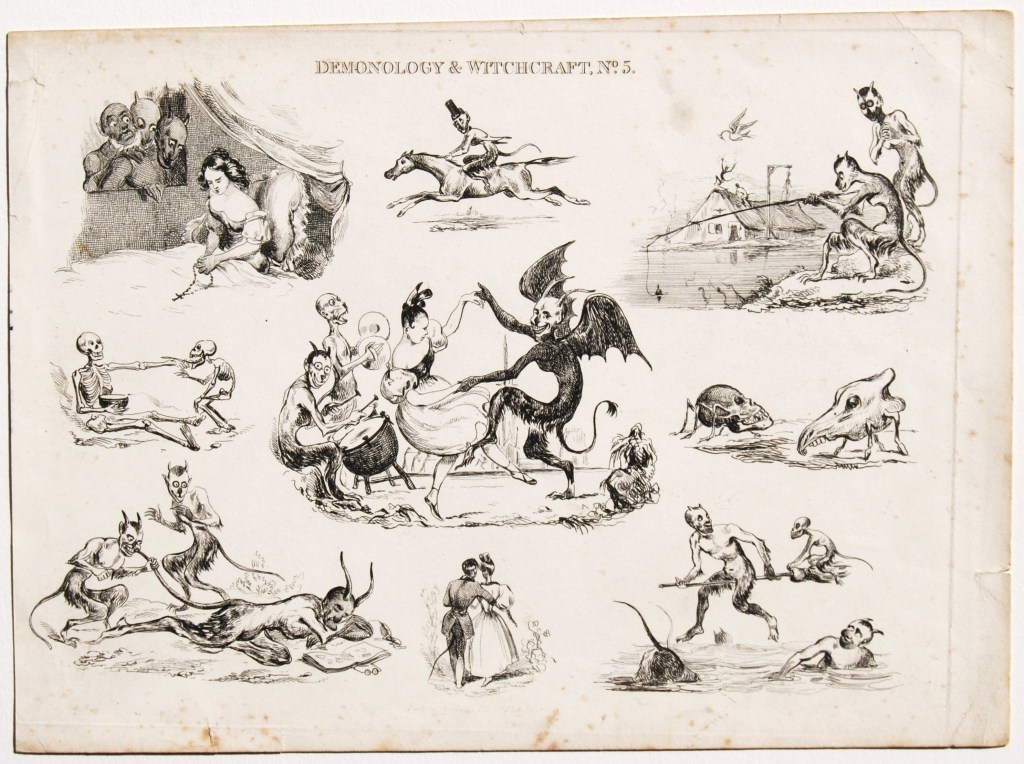In her recent book on confession and witchcraft in early modern France, French Studies scholar Virginia Krause argues that early modern demonology was a ‘science of the night’. The activities of the Devil, and of the witches who served him, occurred in the darkest hours, ‘when the shadows hide his shadow’ (2015, 49). Their influence was felt, but their crimes were hidden. For the period’s witch-hunting demonologists, ‘trying to understand witchcraft was like peering into the darkness of an impenetrable night’ (ibid. 55). To compensate for this visual obfuscation, several strategies were developed for gathering evidence of the witch’s occult acts. The ‘auricular regime’ of confession itself was the most prominent, creating a new epistemic framework within which testimony became seen as the guarantor of truth. Through this and other methods old and new, the demonologist came to believe he could at least perceive—if not necessarily pierce—the darkness that veiled demonological truths.
Krause’s work is distant in historical and geographical focus from David Robertson’s own, which explores the discursive function of the UFO in modern millennial conspiracist cultures. Both, however, share an attentiveness to the construction of socioreligious threats, and the epistemic strategies by which these constructions are realised. Figured as discursive objects, both the witch and the UFO exceeded (or were thought to exceed) the epistemic capacities of contemporary knowledge, necessitating the creation of new forms of knowing. Robertson explores such new forms both in terms of their epistemic strategies and their discursive function. Regarding the former, he analyses the role of epistemic capital (in millennial conspiracisms and as a concept more broadly) in creating counter-epistemic economies that seek to encapsulate and exceed normative epistemic frameworks, suturing traditional and scientific knowledge to alternative knowledges: experience, channelling, and the painstaking synthesis of data and connection. Regarding the latter, he identifies discourses of ‘prevention’ as a strategy of alleviating cognitive dissonance when prophecies fail. In these discourses, prophetic failures are coded not as the fault of the prophet or believers, but as the result of malevolent agencies blocking the advent of utopia. In doing so, it relocates blame from the self, and the community aligned with that self, and places it onto an Other, for which epistemic capital provides the means of discernment and delineation.
Such delineated qualities often mimic those of traditional, theological demons. Indeed, the idea that contemporary conspiracism’s malevolent forces might replicate features of Christian demonology is not itself a novel point. Robertson himself notes this, as have Michael Barkun (2013) and Christopher Partridge (2005). Millennial conspiracism thus comes to share much with more traditional Christian theodicies. Evil becomes its problem to solve. But while those theodicies might appeal to the unknowability of divine will or the demonically-induced fallenness of creation to explain the persistence of worldly evil, conspiracism (also) situates it in the machinations of shadowy networks of agents, more and less supernatural. It is here, more than anywhere else, that conspiracism truly meets demonology. It is simply not enough to name the source of evil or even to understand its nature. It must be located, codified, and catalogued. Its agents must be identified. Whether the means are the confessional regimes of the old scientia daemonis or the experiential, channelled, or synthesised strategies of millennial conspiracism, the conspiracy’s demonological truths—whether literal or metaphoric—must be unveiled.
As a discursive strategy of Othering, Robertson argues conspiracy is specific in that it constructs Others as both active malevolences and as originating from within society itself. The witch, often marginalised by class and gender, might seem an odd comparison here, but the crime of witchcraft was one of treason as much as heresy. Their messages encrypted in demonic languages and their actions concealed in deepest darkness, witches were discursively constructed as walking unseen among the good folk of Christendom, secretly turning society to demoniac ends. The witch was thus a part of Christendom, but its deviant part, the part that needed to be located and excised so that the Body might heal and world order could assume its proper path. For those who have spent time with conspiracist cultures, millennialist or otherwise, this image (albeit perhaps modernised, secularised, or overtly de-Christianised) will be a familiar one. Conspirators—whether human, alien, demonic, or some combination or hybridisation of the three—operate discursively to signal a world potentially being led astray. Their crimes are hidden, but their influence is felt.
Conspiracists, who often construct themselves as heretics and mavericks free of the constraints of socioreligious orthodoxy, would likely abhor any comparison to the witch-hunting demonologists of early modernity. Today’s hoarders of epistemic capital are rarely the rich or powerful. They work (or would like to think they work) at the societal margins, circulating in counter-economies of secrets and disregarded data. By contrast, the early modern demonologists were ultimately agents of regnant order. While they strove (at least theoretically) to maintain a world order constructed as under threat, millennial conspiracists strive to uncover those forces preventing its radical transformation. Both, however, depict a profound anxiety about the trajectory of their society and the desire to rectify it. They share that disorienting sense of crisis, exacerbated by events real and imagined, seen as driving many apocalyptic, millennialist and conspiracist narratives, and the identities of the communities that narrate and are narrated by them (O’Leary 1994). Their anxieties are formulated around perceived failures of historical progression. In millennial conspiracism and early modern demonology alike looms the threat of an unwilled and unwanted tomorrow. When prophecy fails, or the present simply becomes written as ‘the failure of the future’—to use Robyn Weigman’s formulation of apocalypse (2000, 807)—contingency measures become necessary, and the construction of malevolent counter-agencies can become a matter of cognitive and communal survival. Behind both conspiracism and demonology lies the ascription of agency to the shifts in a society, not just in the concatenation of disparate specificities—individuals, movements, organisations, events—but in gestalt. Society as a whole, and the future that society seemed to promise, is seen as failing to reach its fulfilment.
But the processes of societal transformation are often opaque. Thus the means for their detection requires the development of a new ‘science of the night,’ one which could piece the darkness veiling demonological truths. Robertson’s work lays bare many of the methods of this new scientia daemonis. Its means of accruing epistemic capital shares traits with both its historical forebears and its contemporary cousins. Such family resemblances point to another of Robertson’s observations: the lines drawn between ‘new’ religions and their older—more codified, more established, (ergo) more legitimate—kindred. When a Christian activist sits in prayer and the Holy Spirit reveals the demonic forces structuring the US Democratic Party—to use an example Sean McCloud reports on (2015, 32)—the line between traditional revelation and the channelled knowledge of a David Icke or Wilcock becomes at best nebulous. Both are inadmissible in the courts of dominant epistemic strategies, but they nonetheless draw on the same sources of knowledge and strategies of knowing to identify, codify, comprehend, and thereby either conquer or circumvent those worldly and otherworldly forces striving secretly in the service of futures found wanting.
References
- Michael Barkun, A Culture of Conspiracy: Apocalyptic Visions in Contemporary America. Second Edition (Berkley, CA: University of California Press, 2013).
- Virginia Krause, Demonology, Witchcraft, and Confession in Early Modern France (Cambridge: Cambridge University Press, 2015).
- Sean McCloud, American Possessions: Battling Demons in the Contemporary United States (Oxford: Oxford University Press, 2015).
- Stephen D. O’Leary, Arguing the Apocalypse: A Theory of Millennial Rhetoric (Oxford: Oxford University Press, 1994).
- Christopher Partridge, The Re-Enchantment of the West, Volume 2: Alternative Spiritualities, Sacralization, Popular Culture, and Occulture (London and New York: Continuum, 2005).
- Robyn Weigman, ‘Feminism’s Apocalyptic Futures,’ New Literary History 31:4 (2000), 805–825.



